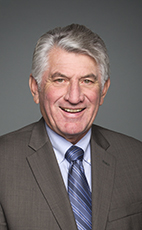Mr. Speaker, I am pleased to have the opportunity to speak to the success of our front line police officers who were able to protect the safety of visitors and delegates during the G8 and G20 summits.
I just heard my hon. friend talking about lofty promises. I would just remind him of a lofty promise that came from him in this House on April 21, 2009 when he said:
I am particularly proud of our leader, the leader of the New Democrat opposition, who has freed all MPs to vote at their conscience and as their constituents dictate.
We will see how that pans out tomorrow.
I would like to remind the member opposite of the Auditor General's observations from May. She said, “Obviously $1 billion is a lot of money, but I think we have to recognize that security is expensive. There are a lot of people that are involved over a long period of time. We may think that the meetings only last for a few days [as my friend suggested], but all the preparations involve extensive planning, extensive coordination for months before that and I think we have to be really, really careful”.
The notion that these events, which represented the largest security undertaking in Canadian history, were restricted to a 72-hour period is not an accurate reflection of reality.
The simple fact is that security planning began well over a year and a half prior to the summits and involved the coordinated participation of several federal security partners, including the RCMP, Public Safety Canada, the Department of National Defence, the Canadian Border Service Agency, CSIS, as well as several other departments, not to mention our provincial and municipal security partners who were crucial to the provision of security for these events.
This extensive security planning process was indicative of the complexity and scale of hosting these events. Unlike the Olympics, the summits were a security event that had 38 world leaders in attendance, as well as 5,800 delegates and 2,600 journalists.
Canadians can be proud of how our security partners were able to protect the safety of Canadians, delegates and visitors to the city of Toronto and the town of Huntsville, working in what were exceptionally difficult circumstances.
Canadians can be proud of the progress that this government achieved during these meetings on global governance and opportunities for emerging economies.
The G8 was successfully refocused on its strengths: development, peace and, of course, global security challenges.
The G20 summit resulted in an action plan for entrenching the global economic recovery, including reducing global deficits, financial sector reform, progress on anti-protectionism and debt relief for Haiti. As well, it set the stage for an enhanced level of discussion that will occur at the G20 summit in South Korea this November.
Unfortunately, there are those who seek to disrupt and prevent these summits through unlawful activities. Consequently, a large scale and world-class security plan was necessary to deliver the security required.
This government has been transparent in representing the costs of hosting these important events from the outset and will continue to be. Full co-operation was granted to the Parliamentary Budget Officer to review the security cost estimates. After his assessment, Mr. Page concluded that the government had been transparent in representing the cost estimates and that they were within the range of security costs for recent G8 summits.
The government has also invited the Auditor General to review the security costs and is co-operating fully with this process. The Auditor General's report is scheduled to be released next spring.
In the meantime, as stated before, final security costs will be reported once they have been finalized.

